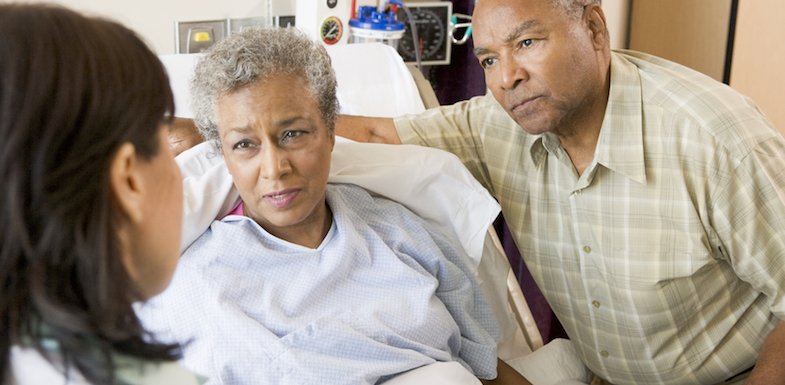
Caregiving to someone with an illness or chronic pain is a noble pursuit that helps millions of people each day. An estimated 44 million people in the U.S. age 18 and older are a caregiver who provides unpaid assistance to adults and older people with disabilities who live in the community. That amount of that care is estimated to be around $306 billion dollars annually, almost double the cost of in-home health care! Suffice it to say, a chronic pain caregiver provides a vital function that is critical to the national health care system on a whole. Here’s how to take care of yourself and your loved one.
Caregiver 101: Protecting the health of your loved one
If you feel helpless while trying to support a family member experiencing chronic pain, you’re not alone. You want to offer help, but may feel overwhelmed and unsure how to react. These feelings are completely natural.
Keep in mind that any gesture you make to show you care goes a long way to reducing your loved one’s stress. Here are a few specific ways to help.
1. Communicate
Let your loved one know that you’re available at any time to talk or listen. Chronic pain sufferers may try to avoid burdening you with their feelings, but keeping the lines of communication open will help the whole family acclimate to a condition that affects everyone.
2. Keep an open mind
Try to be non-judgmental. In your effort to help, you may find yourself unwittingly criticizing your loved one’s coping skills or ways of dealing with a physical handicap. This creates stress and makes people feel less than enough or ashamed. Instead, simply be present, listen, and show support, even if your family member is having a rough or emotional day.
3. Prepare meals
Eating a nutritious diet full of anti-inflammatory foods such as fruits and vegetables helps to fight pain from the inside out. Unfortunately, people who suffer from chronic pain may lack the energy or physical ability to cook for themselves. Taking the time to prepare a healthy meal for your family member supports their quest for pain management while eliminating the need to cook.
Even if you don’t happen to eat many vegetables, helping someone with chronic pain achieve this lifestyle change marks another way of showing you care.
4. Attend doctor appointments
People with chronic pain likely see one or more doctors for help with managing the condition. Doctor appointments create multiple types of stress that you can ease just with your presence. Helping a family member navigate the sign-in process, accompanying their wait for the appointment to begin, writing things down the doctor says, and driving home after it’s all over makes the stress of doctor appointments more tolerable.

5. Be patient
Unless you’ve experienced chronic pain, you probably don’t know what it’s like to deal with discomfort day in and day out. Your loved one may find it difficult to complete tasks that you find easy or experience stress regarding situations you don’t understand. Fortunately, you needn’t understand what he or she is going through, only that navigating chronic pain is difficult. Having compassion and showing patience goes a long way to helping your family member manage stress.
6. Slow down
People with chronic pain may have trouble walking or operate at a slower pace than you. Slowing down to match your loved one’s pace removes pressure to rush and keep up. This simple act shows you care, that you’re patient, and you understand the challenge of living with chronic pain.
Caregiver 101: Protecting your health
Everyone has to depend on caregivers throughout their life, professional or not, whether it be parents when we are children, doctors when we are hospitalized, or friends and family when we are too sick to leave our homes. It is just as likely that you will also become a caregiver at some point during your life as well. So, the question becomes, what effect does caregiving have on the mental and physical wellbeing of a chronic pain caregiver?
The impact of caregiving on chronic pain caregivers
Caregiving can have some detrimental effects on many different health aspects of a chronic pain caregiver. This is doubly so in those caregivers who lack proper resources or knowledge to effectively care for their charges. These effects are becoming so prevalent that the medical community has named it the caregiver syndrome.
The level of burden and strain also depends on what kind of caregiving is taking place. A much higher level of stress is reported when dealing with certain disorders, such as dementia or end-of-life care. Furthermore, two-thirds of unpaid caregivers are female, which is significant because female caregivers generally fare worse mentally than their male counterparts when having to cope with long-term care situations. This is due to women caregivers facing more caregiving demands, spending more time providing care, and contributing more involved day-to-day caregiving tasks than men.
We know that health problems can come in the form of both mental and physical manifestation. Let’s take a look at some of the more common issues that a chronic pain caregiver has to face on a daily basis.
Mental factors
Depression is one of the most common negative effects on caregivers. A report from a National Consensus Development Conference for Caregiving shows that between 40% and 70% of caregivers of older adults have clinically significant symptoms of depression and up to half of those meet the criteria for major depression. This usually stems from seeing loved ones become ill and the feeling of being overwhelmed by the situation. It has also been shown that women who care for their spouses more than 36 hours a week are almost six times more likely than non-caregivers to experience depression or anxiety symptoms.
Stress and frustration can also be a large factor that affects a chronic pain caregiver. In a Georgetown University study, it was found that 22% of caregivers are exhausted when they go to bed and 26% say taking care of an older adult is hard on them emotionally. Many feel this way because they cannot handle their caregiving responsibilities, which only increases their stress response.
Caregivers are also much more likely to use prescription or psychotropic drugs than non-caregivers. They also have a slightly increased chance of abusing alcohol to try and cope with the various emotions tied with helping a loved one.
Physical factors
A chronic pain caregiver has double the likelihood of developing a chronic condition, such as cancer or diabetes, as compared to a non-caregiver.
Caregivers, especially woman, also have a greater risk of heart disease. A study shows evidence that caregivers that provide more than nine hours a week of care to a spouse are twice as likely to develop heart disease. However, this risk did not increase when caring for parents or other patients.
Caregivers are also less likely to practice preventative care and monitor their own health and well-being. This can lead to a variety of negative outcomes that includes:
- Sleep deprivation
- Lack of exercise
- Irritability
- Increased chronic health problems
- Poor diet
- Stomach issues
- Neglect visiting a health professional
How to bolster positive health
Family caregivers are essential to the nation’s health care system, so it is imperative that we find ways to alleviate the negative impacts that this service entails. Here are some tips and tricks for caregivers to avoid these health consequences without sacrificing the care to the ones you love.

1. Manage your stress
This sounds obvious, but now that you know some caregiving warning signs, you can take further steps to identify what exactly is stressing you out. Once you do that, categorize your stress into what you can and cannot change. Finally, focus on what you can change by taking action to alleviate that stress. Maybe you need a night on the town or to have dinner with a friend. Whatever helps you destress is the right way to go!
2. Get help and make a plan!
Taking care of someone in chronic pain or with a disability can be difficult and time-consuming. This can be quite the burden for a single person to tackle alone, so make sure you take advantage of local and federal programs to help alleviate some of the strain. It is hard for most caretakers to leave their charges behind to do self-care, but respite is a must for caregivers to remain healthy and should not be taken lightly.
3. Study up
One of the major causes of stress and anxiety for a caretaker is not understanding the disease their loved one has. Doing some research or asking a physician for material is always a smart move and, with more education, comes less doubt and fear.
4. Join a support group
Nothing gives perspective like sharing your struggle caring for a loved one with those who have gone through a similar experience. Being able to talk to others who understand your situation (even if it is only online from the comfort of your own home) can do wonders for your stress level and mental health in general.
If you are a chronic pain caregiver, what strategies do you use to stay in good health? To find more help for your loved one, you can also reach out to our network of pain specialists here.